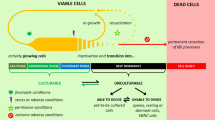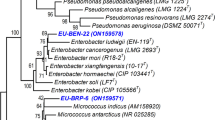Summary
Two indigenous and one non-indigenous bacterial strains were evaluated for their ability to degrade p-nitrophenol (PNP) in pure culture. When these bacterial strains were inoculated into industrial wastewater to enhance the degradation of PNP in the presence or absence of glucose, all three strains degraded 20 mg/l of PNP with or without added glucose. With PNP (20 mg/l) and glucose (100 mg/l), non-indigenous strain Corynebacterium Z-4 utilized glucose and PNP simultaneously. Unexpectedly, indigenous strains Pseudomonas putida and Corynebacterium Z-2 utilized PNP first. The behavior of the non-indigenous isolate Corynebacterium Z-4 was also somewhat surprising because when inoculated into lake water containing 26 ug/l of PNP and 100 mg/l of glucose, it preferentially utilized glucose (Zaidi et al. 1995). However, in industrial wastewater containing the same PNP and glucose concentrations, it instead switched and utilized PNP first.
Similar content being viewed by others
References
Barles, R. W., C. G. Daughton, and Hsieh D. P. H. (1979). Arch. Environ. Contam. Toxicol. 8, 647.
Brunner W., F. H. Sutherland and Focht D. D. (1985). J. Environ. Qual. 14, 324.
Focht D. D., and Brunner W. (1985). Applied and Environ. Microbiol. 50, 1058–63.
Gerstl, Z., and Helling C. (1985). Soil Biology and Biochemistry 17, 667–673.
Hoben, H. J., and Somasegaran, P.(1982). Appl. Environ. Microbiol. 44, 1246.
Keith, I. H., and Telliard, W. A. (1979). Env. Sci. and Technol. 13, 416.
Kunc F., J. Rybarova., and Lasik, J. (1984). Folia Microbiologia 29, 148–155.
LaPat-Polasko L.T., P. L. McCarty and Zender, A. (1984). Appl. Environ. Microbiol. 47, 835–830.
Rozich A. F., and Colvin R. J. (1986). Biotech. Bioeng. 28, 965–971.
Scow, K. M., S. K. Schmidt., and Alexander M. (1989). Soil Biol. Biochem. 21, 703–708.
Schmidt S. K., and Alexander M.(1985). Appl. Environ. Microbiol. 49, 822–827.
Schmidt S. K., K. M. Scow, and Alexander M. (1987). Appl. Environ. Microbiol. 53, 2617–2523.
You I.-S., and Bartha R. (1982). Appl. Environ. Microbiol. 44, 678–681.
Zaidi, B. R., G. Stucki, and Alexander, M. (1988). Environ. Toxicol. Chem. 7, 143.
Zaidi, B. R., Y. Murakami, and Alexander, M. (1989). Environ. Sci. Technol. 22, 1419.
Zaidi, B. R., and Narinder K. Mehta. (1995). Biodegradation 6, 275–281.
Author information
Authors and Affiliations
Rights and permissions
About this article
Cite this article
Zaidi, B.R., Mehta, N.K., Imam, S.H. et al. Inoculation of indigenous and non-indigenous bacteria to enhance biodegradation of p-nitrophenol in industrial wastewater: Effect of glucose as a second substrate. Biotechnol Lett 18, 565–570 (1996). https://doi.org/10.1007/BF00140204
Issue Date:
DOI: https://doi.org/10.1007/BF00140204




